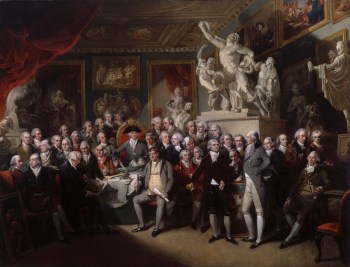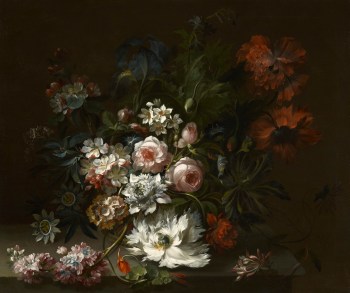Charles Catton the Elder RA (1728 - 1798)
Charles Catton the Elder RA (1728 - 1798)
RA Collection: People and Organisations
Charles Catton was a Founder Member of the Royal Academy who served as coach-painter to King George III.
Born in Norwich in 1728, Catton was reportedly one of 35 children from his father’s two marriages. He was apprenticed to the London coach-painter Thomas Maxfield and also studied at the St Martin’s Lane Academy established by William Hogarth. Catton went on to train several apprentices himself, including his younger brother James, his son Charles Catton the Younger, and future Royal Academician William Owen.
Catton established a reputation as a coach-painter and was appointed official coach-painter to King George III. He also reportedly decorated the carriage of Joshua Reynolds, the first President of the Royal Academy, with four panels representing each of the four seasons. He exhibited regularly at the Society of Artists between 1760 and 1768, when he seceded to the newly-founded Royal Academy of Arts as a Founder Member. He worked with Joshua Reynolds, Angelica Kauffman, Benjamin West and Giovanni Cipriani on decorating the Academy’s first official home at Somerset House.
In 1783 Catton served as Master of the Company of Painter-Stainers, one of the Livery companies of the City of London. In addition to his work on coaches, Catton produced many paintings of landscapes and animals, which he exhibited regularly at the Royal Academy, showing at least one work every year until his death in 1798.
RA Collections Decolonial Research Project - Extended Biography
Catton had a son, also Charles (1756-1819), a landscape painter and book illustrator who studied at the RA Schools. In 1804, Catton the Younger emigrated to America and settled on a plantation on the River Hudson where he owned enslaved people. There is an account of Catton beating one of his enslaved workers, Robert, who was in a relationship with Sojourner Truth (born Isabella Baumfree), an enslaved woman on a neighbouring farm. Catton did not approve of the relationship because he did not want Truth to fall pregnant, believing that if she had a child this would benefit his neighbour through increasing the number of enslaved people owned by him (see Notes, 1).
For more information on this research project, please see https://www.royalacademy.org.uk/article/ra-collections-decolonial-research
Notes
- Sojourner Truth, Narrative of Sojourner Truth (Boston, 1850); https://digital.library.upenn.edu/women/truth/1850/1850.html (accessed 1 March 2022).
Relevant ODNB entries
[Anon.], and Martin Myrone. “Catton, Charles, the elder (1728–1798), painter.” Oxford Dictionary of National Biography. 23 Sep. 2004; Accessed 1 Mar. 2022. https://www-oxforddnb-com.lonlib.idm.oclc.org/view/10.1093/ref:odnb/9780198614128.001.0001/odnb-9780198614128-e-4901
Baker, Anne Pimlott. “Catton, Charles, the younger (1756–1819), landscape painter and book illustrator.” Oxford Dictionary of National Biography. 23 Sep. 2004; Accessed 1 Mar. 2022. https://www-oxforddnb-com.lonlib.idm.oclc.org/view/10.1093/ref:odnb/9780198614128.001.0001/odnb-9780198614128-e-4902
Profile
Foundation Member
Born: 1728 in Norwich, Norfolk, England, United Kingdom
Died: 28 August 1798
Nationality: British
Elected RA: 10 December 1768
Gender: Male
Preferred media: Painting, Coach painting, and Heraldic painting


